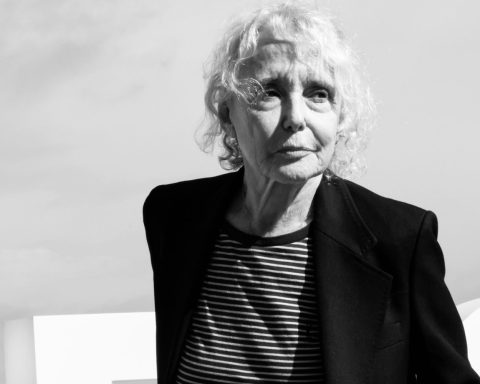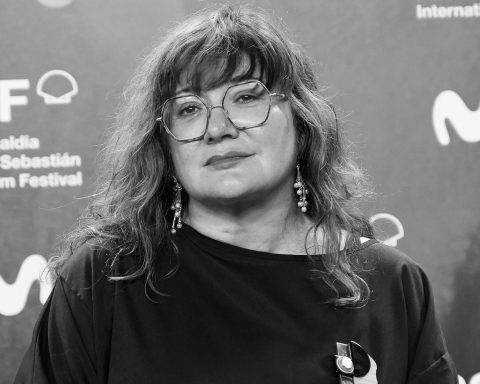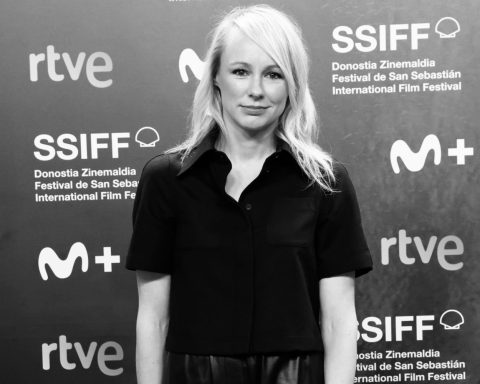Icelandic film director Kristín Jóhannesdóttir completed her Bachelor’s and Master’s Degrees in Literature and Cinema in 1974 and a D.E.A. degree in Theory of Cinema in 1976 at the Paul-Valéry-University in Montpellier, France, where she did research on women in cinema as auteurs/directors. She also studied at the Sorbonne University in Paris and Film Directing at the Conservatoire Libre du Cinéma Français, which she graduated from in 1978. She made her first short films in 1976 (“Arthur and Rosa”) and 1978 (“Sad Mornings After”). In 1983, Jóhannesdóttir directed her first feature film from her own script, “Á hjara veraldar” (“Rainbow’s End”), produced by Völuspá, the production company she founded with Sigurður Pálsson. In 1985, she directed the tele-film for the Icelandic Television “Líf til einhvers” (“A Purpose in Life”) and another one in 1988, “Glerbrot” (“Broken Glass”), starring the singer Björk in the leading role. Her second feature, “Svo á jörðu sem á himni” (“As in Heaven”), was chosen to be Iceland’s contribution to the Nordic Co-Production Year in 1992. It was first shown in the Official Selection (Out of competition) at the 1992 Cannes Film Festival before going on to win several prizes at numerous film festivals – Mannheim, London, Bruges, Marseille, Créteil, Sainte-Thérèse Montreal among others – and has screened at around twenty-five film festivals, and commercially in three countries outside Iceland. “Alma,” her third feature film, premiered in Iceland in 2021 and was nominated for the Nordic Council Prize. Jóhannesdóttir has also directed two short films, “Laxness” and “Col Tempo” in 2002. She has also been an important theater director alongside her work in cinema and was also chosen to serve in many official roles between 1991 and today. In 2015, she was made Knight of the Order of the Falcon and honored as the Artist of the City of Reykjavík. In 2018, she was made Chevalier de l’ordre national du Mérite by the President of France.
At this year’s RVK Feminist Film Festival, Tara Karajica talked to Kristín Jóhannesdóttir about her film career so far, feminism and cinema and her next film.
In your introduction of the film composing event at the RVK Feminist Film Festival, you said you studied Film in France and that a professor of yours said where you put your camera is important; it defines you and your filmmaking. Can you talk about that? How would you describe your filmmaking? How would you define your style?
Kristín Jóhannesdóttir: For my doctorate degree thesis in France, I did research on films by women directors. I thought it would be important to concentrate on the phenomenon of the point of view of women directors. I was trying to discover if they had something in common. When I told my professor about the idea, he asked me to remember that it is “always and will be an ethical, social, political, aesthetic and moral choice where you put your camera.” In his opinion, it defines who you are and what kind of meaning or sense you want to give your film. At that time, in my twenties, I found that rather overwhelming, but later, I understood fully what it meant and it became an important thought on how to create my own film language.
Can you talk about your student days? How did you perceive film and filmmaking then?
K.J.: Obviously, from the beginning, it distinguished my films from others. I did not belong to the crowd of boys that were making films in Iceland. For some time, I was the only woman making films here and, furthermore, my films did not follow the usual imitation or mimesis of representing life. If I were to describe my style, I think it would be possible to say that my ideal way of creation is limitless curiosity. I have the urge to search for the unclassified cases having an active dialogue with the hidden or frustrated truth. I express situations in a familiar but, at the same time, strange or uncanny way. The term “unheimlich” could be used, locating the strangeness in the ordinary. In short, it would, in fact, express anxiety (Freud) or a form of repressed memory (J. Lacan).
How has filmmaking changed since then?
K.J.: It is difficult for people that didn’t participate in the whirlwind around the year of 1968 to imagine the state of things today. Following ’68, there were women who surfaced in great numbers with their films. It was an awakening of new ideas, of a new energy. But it was not only women that made History. In France, there was the New Wave and the Rive Gauche groups of men and women who blasted old traditions of cinema. What would cinema be today without the mind-blowing works from that time – Jean Luc Godard and Agnès Varda? Everything changed and I loved it. But, all the same, I studied the old masters with great respect. Bergman and Dreyer will be alive and kicking forever!
I heard a story where Björk was not happy with her turn in your film. Can you elaborate on that?
K.J.: Glerbrot (Broken Glass) is a TV film that premiered in 1988 and is an opera film. The mise-en-scène was inspired by “The Scream” by Edward Munch. A screaming anguish of a young girl locked up in a “home” for teenage girls. In the production, there were some of the most experienced and respected actors in the country. Björk was very young when we shot it. She was a natural talent, a performer. When we reviewed Broken Glass at the WIFT Film Festival in January 2023, the reception of the audience was simply fantastically positive. A drama teacher and two highly respected and experienced actresses who played the main roles in Broken Glass, found it just beautiful and were surprised how modern it was in all aspects. At that time, the cries for help were silenced by the authorities. But today, more victims are coming forward. It is heartbreaking to witness the consequences of the violence forced on many victims of these “homes” around the country. Opinions are what they are, nothing more, nothing less. But my responsibility towards Broken Glass lies in an ethical, social, political, aesthetic and moral choice for the subject and the mise-en-scène in order to reveal the inner traumatic harm done to them. Their whole lives have been damaged.
26 years have passed between Alma and your previous film. Why? Can you talk about this experience?
K.J.: 26 years is long time and a time of many scripts and different versions of those scripts. I had the plan to make at least one film about each human sense. I had already made the acclaimed and multi award-winning film about sight, As in Heaven. But after a number of scripts, it came to the point where no senses were left. I was out of senses. But after some research, I found out that in the Japanese culture of ancient times, there were seven senses. In addition to our five senses, they also had one for the intuition and the last one was a direct connection with the cosmic forces. I then continued to write scripts about these senses. The Film Centre kept me waiting for the production funding. The years passed. Then, an unexpected thing happened in 2013 when I had more or less given up all hope of making more films and I was getting many more interesting projects in theater, the Icelandic Film Academy decided to make me an Honorary Member of the Academy. At that moment, I saw the possibility to have a voice as the event was live on national TV and the President of Iceland was my bodyguard. I pointed out in my speech that there was not one woman nominated as a director, and the very few roles of women actresses did not fill the nomination quota. This was not only inequality and injustice, but also a dangerous state of things and risked to be a hindrance to the healthy progress of cinema and of society as a whole. I asked: “What is this supposed to mean?” I received hundreds of emails from women from all over the country thanking me for speaking up. Following that event, the Film Centre took into consideration my script called Alma and some other projects by women. Bingo!
In that sense, what is your view on the situation of women in film today? How is it in Iceland now?
K.J.: There are very talented women directors working in the Icelandic film industry now, but we must always be aware of the tendency of regression that is very often the case towards progress.
Are you a feminist? If so, how does it inform your filmmaking?
K.J.: I am a believer in equality and yes, I am therefore a feminist. My films are about women on the front lines with all their traumas, mistakes and strength, fighting for their lives and for a balance in their existence.
Do you have a favorite film by a female filmmaker and a favorite female filmmaker?
K.J.: I’m incapable of narrowing my choice down to one, but these are my three favorite ones and very important films of theirs: Agnès Varda and Cléo from 5 to 7, Chantal Akerman and Jeanne Dielman, 23 Quai de Commerce, Bruxelles, and Jane Campion and The Piano. These are film directors that have with their films moved mountains and revitalized the language of cinema.
What are your next projects?
K.J.: A swan flies on an electric wire. The swan dies instantly and falls down to the earth. Fire breaks out and threatens children that are planting little trees. One little girl dies. At that moment, destinies are created for many people. Amongst them is the blind twin sister of the dead girl. The twin sister as an adult is struggling with survivor’s guilt. Haunted by the memory of her dead sister, she has dedicated herself to climate innovative technology. In short: the cleansing of inner and outer pollution. Twin myth and doppelgängers are at the center of the film project I’m writing these days. My stories are all about dualism and how we, humans, are forced to deal with it from inside out to find out who we are.
Photo credits: Courtesy of Kristín Jóhannesdóttir.
This interview was conducted at the 2023 RVK Feminist Film Festival.









